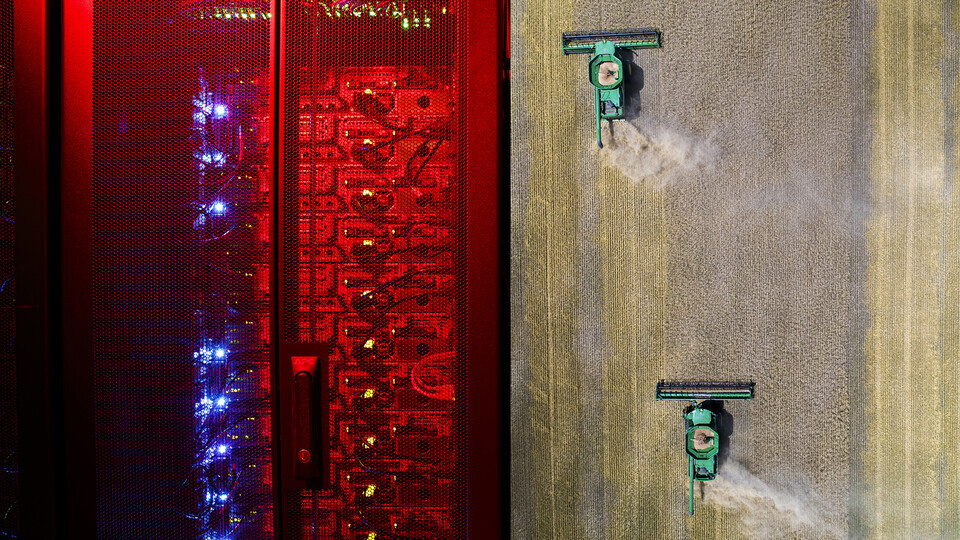
Lincoln, Neb. —Campus leaders testified on Feb. 17 in favor of legislative proposals that would tap federal funds and University of Nebraska–Lincoln expertise to grow agriculture and technology innovation, and feed economic growth statewide.
The proposals — LB 703 and LB 904, both under consideration by the Nebraska Legislature’s Appropriations Committee — would support construction of a facility focused on developing new technologies/talent to aid ag producers and food manufacturers, and expanding the Holland Computer Center’s supercomputing and cybersecurity capabilities. The projects are among a number of proposals being considered by state leaders on how Nebraska can best invest federal COVID-19 relief funds from the American Rescue Plan Act of 2021.
Both of the proposed facilities would be based at Nebraska Innovation Campus, allowing for greater collaborations between federal and university researchers and industry partners. Dozens stepped forward to voice support for the two proposals during the Feb. 17 hearing.
Mike Boehm, vice chancellor for the Institute of Agriculture and Natural Resources, was among supporters of LB 703. The bill would provide $25 million toward establishing a companion facility to support the United States Department of Agriculture’s proposed National Center for Resilient and Regenerative Precision Agriculture.
“This companion facility will accelerate the conversion of cutting-edge ideas and discoveries from our university’s researchers into innovative products and services resulting in increased productivity and profitability of Nebraska’s farmers, ranchers, agricultural processors and food manufacturers,” Boehm said. “This facility will also serve as a business incubator providing an array of supports for Nebraska’s ag entrepreneurs and startup companies.”
As proposed, the $50 million companion facility will feature a public-private partnership with an additional $25 million provided via private funds. The first floor of the four-story, 80,000-square-foot facility will serve as support space for entrepreneurs, early-state startups and established companies, connecting them with discoveries from federal and university-based researchers. The other three floors would provide space for state-of-the-art innovation maker spaces, laboratories and high-bay spaces that would bring together researchers and students.
“This multi-faceted, public-private collaboration will yield important economic benefits for our state,” Boehm said. “In all, this initiative has an estimated economic impact of $1 billion annually, $170 million in labor income for Nebraskans, and create about 3,200 Nebraska jobs.”
LB 703 was introduced by Sen. Matt Williams (District 36) of Gothenburg.
The $50 million expansion of the Holland Computing Center via LB 904 would also support the new USDA facility. It would allow the university to expand capacity for high-speed computing resources available to private companies and campus researchers.
It includes infrastructure designed to enhance artificial intelligence computing and cybersecurity, allowing for greater collaboration with the NU-based National Strategic Research Initiative and other cutting-edge partners. Other areas of research that could benefit from the expansion include machine learning, data science, manufacturing and health care.
In his testimony, Chancellor Ronnie Green said the project would be a direct benefit to Nebraska’s ag industry and the state’s economy.
“This new data center, with more artificial intelligence computing and cybersecurity capabilities, will help Nebraska business, agri-business and ag producers protect their data and boost real-time data availability,” Green said. “And, over a 10-year period, this initial $50 million investment will conservatively enable more than $1 billion in capital investment and (research and development) spending in the state of Nebraska.”
Launched in the early 1990s, the Holland Computing Center was the first super-computing facility to further research efforts on campus and across the University of Nebraska system. Today, it continues to serve as the high-performance computing core for the NU system with locations at the University of Nebraska–Lincoln and the Peter Kiewit Institute at the University of Nebraska at Omaha.
Along with NU researchers, the Holland Computing Center is used for a number of other national and global studies, including the Compact Muon Solenoid detector at the Large Hadron Collider near Geneva, Switzerland.
As proposed, the data center would be designed as a modular building. It would be tied into Nebraska Innovation Campus’ Centralized Renewable Energy System, which uses a city wastewater system to heat and cool buildings. Heat from the data center facility would be used to increase the efficiency of the Nebraska Innovation Campus HVAC system.
“This investment will ensure that Nebraska is a regional hub of excellence and economic growth in cybersecurity and artificial intelligence for generations to come,” Green said. “It is crucial in safeguarding Nebraska’s agricultural, manufacturing, financial, logistics, and other industries. And, it will spur advances in other key digital domains important to Nebraska, including civic infrastructure, Omaha’s architectural engineering expertise, smart buildings, national defense and healthcare sectors.”
LB 904 was introduced by Sen. Myron Dorn (District 30) of Beatrice.
The Appropriations Committee will consider the merits of LB 703 and LB 904. If approved, the bills will advance for further consideration by the Legislature.







